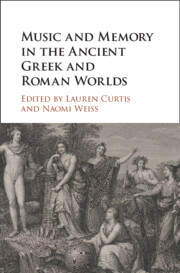Book contents
- Music and Memory in the Ancient Greek and Roman Worlds
- Music and Memory in the Ancient Greek and Roman Worlds
- Copyright page
- Contents
- Figures
- Contributors
- Acknowledgments
- Note on Texts and Abbreviations
- Part I Approaching Music and Memory
- Part II Music, Body, and Textual Archives
- Chapter 2 Musical Memory on Delos
- Chapter 3 Remembered but Not Recorded
- Chapter 4 Incorporating Memory in Roman Song and Dance
- Part III Technologies of Musical Memory
- Part IV Audience, Music, and Repertoire
- Part V Music and Memorialization
- Bibliography
- General Index
- Index Locorum
Chapter 2 - Musical Memory on Delos
Theseus in the Archive and the Repertoire
from Part II - Music, Body, and Textual Archives
Published online by Cambridge University Press: 14 October 2021
- Music and Memory in the Ancient Greek and Roman Worlds
- Music and Memory in the Ancient Greek and Roman Worlds
- Copyright page
- Contents
- Figures
- Contributors
- Acknowledgments
- Note on Texts and Abbreviations
- Part I Approaching Music and Memory
- Part II Music, Body, and Textual Archives
- Chapter 2 Musical Memory on Delos
- Chapter 3 Remembered but Not Recorded
- Chapter 4 Incorporating Memory in Roman Song and Dance
- Part III Technologies of Musical Memory
- Part IV Audience, Music, and Repertoire
- Part V Music and Memorialization
- Bibliography
- General Index
- Index Locorum
Summary
This chapter explores how Diana Taylor’s definition of “archive” (e.g., historical artifacts and written records) and “repertoire” (performance practices) as distinct but related forms of cultural memory illuminates the representation of mythic performance in Plutarch’s Lives. More than simply applying modern performance theory to ancient texts, my analysis brings Plutarch into dialogue with Taylor, showing that he reflects upon similar theoretical problems in a distinctive way. In recounting Theseus’ visit to Delos, Plutarch describes how the hero’s defeat of theMinotaur is commemorated by object dedication and choral dance. These two acts of memory are closely intertwined, as both ritual object and mimetic dance function as vehicles to transmit specific elements of the myth. Yet Plutarch also questions the efficacy of dedications and performance practices as such vehicles, calling attention to the limits of both object endurance and mimetic song-dance. By positioning his own writing as a form capable of encompassing and surpassing both the archive and the repertoire, he ultimately reveals how the literary text itself both instantiates and complicates those very distinctions.
- Type
- Chapter
- Information
- Music and Memory in the Ancient Greek and Roman Worlds , pp. 65 - 80Publisher: Cambridge University PressPrint publication year: 2021



